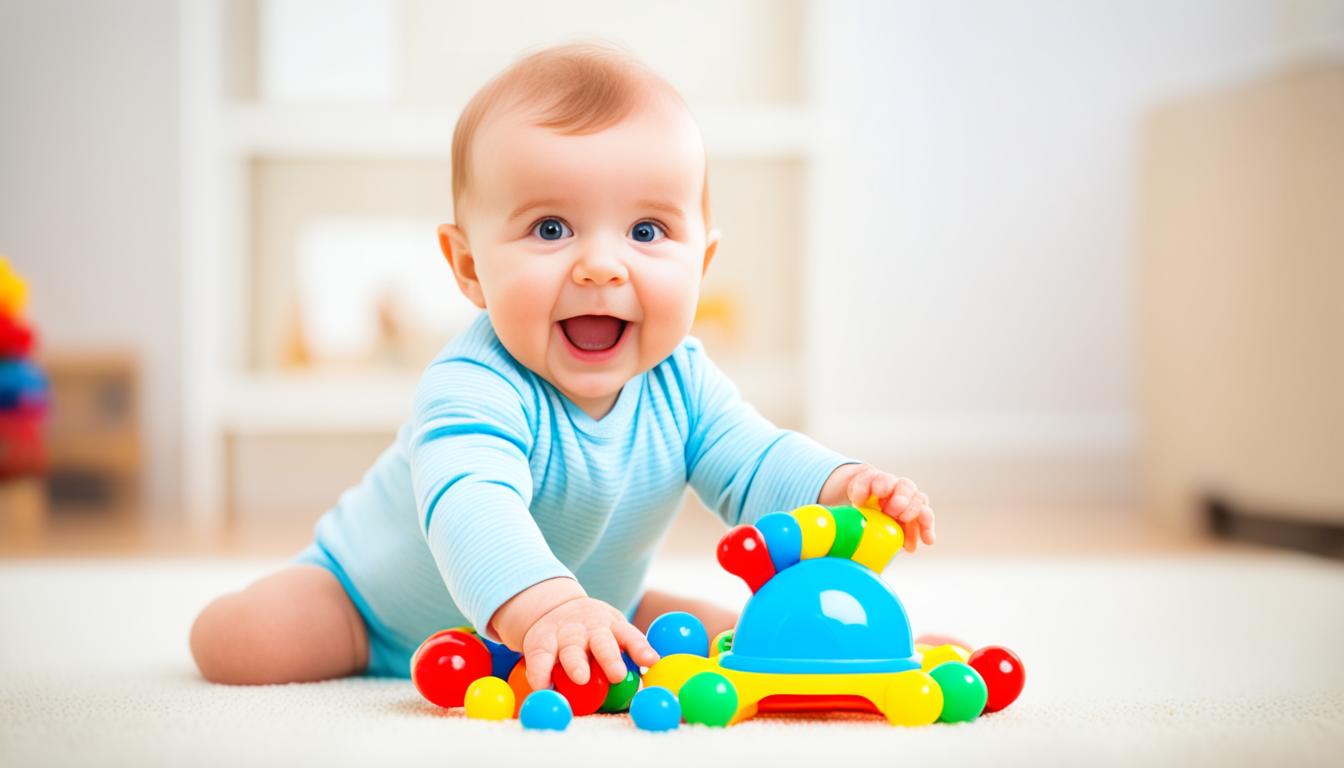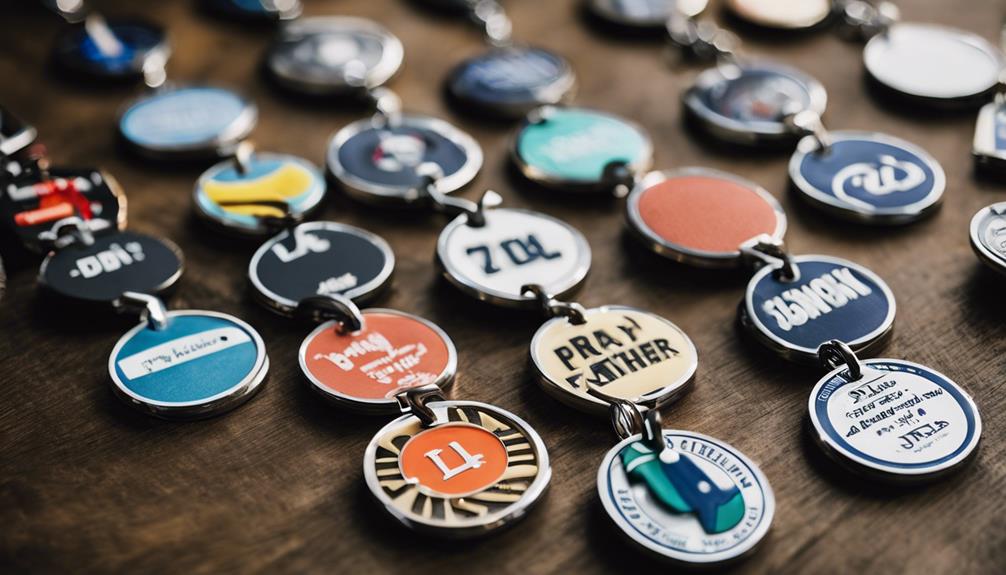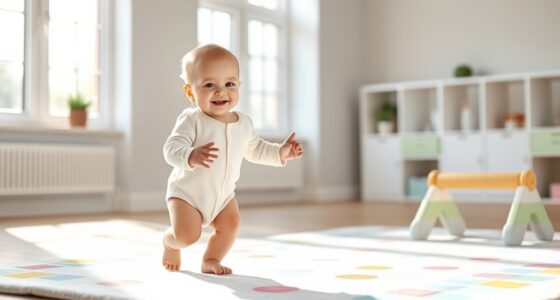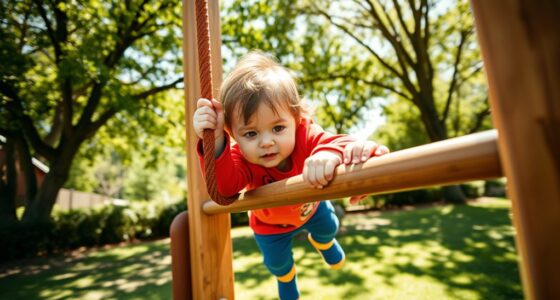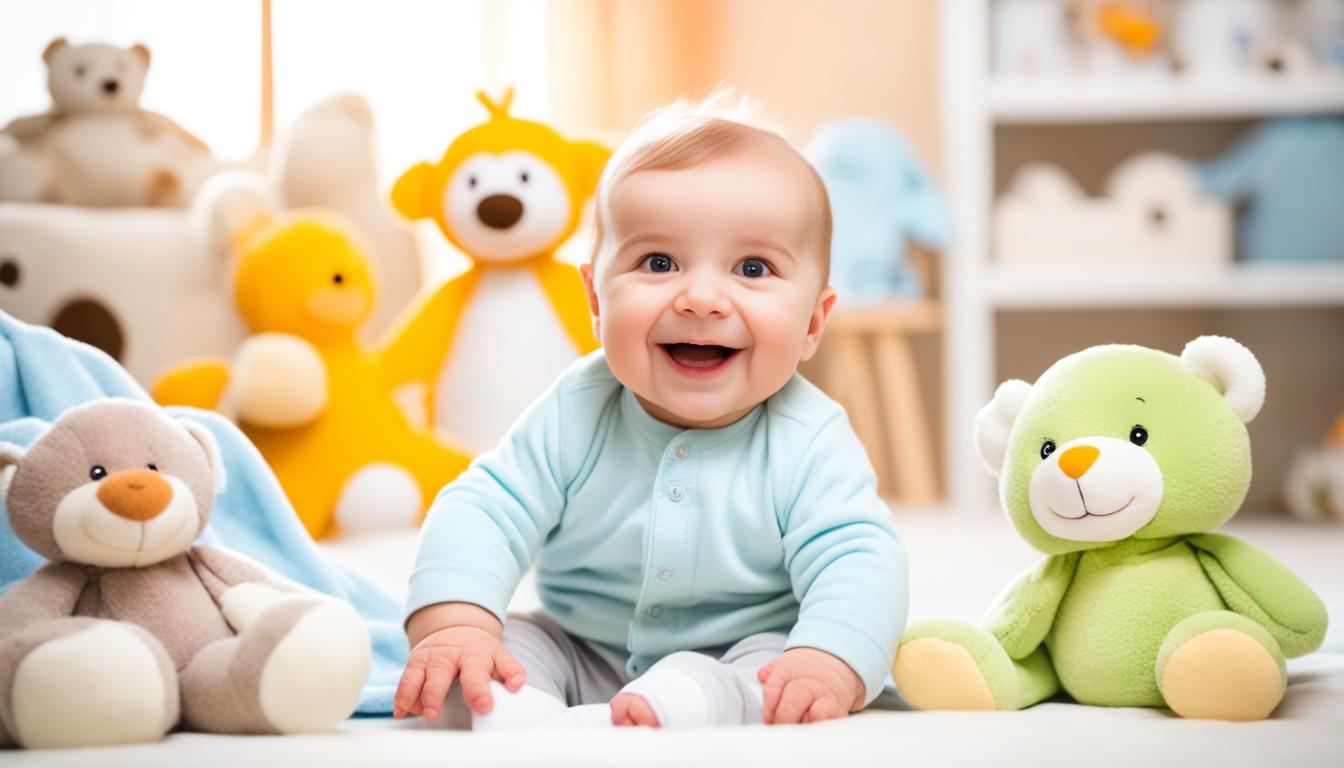The development of motor skills is crucial for the growth and development of your baby. As soon as they begin to move, infants start to build core motor skills, highlighting the importance of early motor skill development. These skills can be categorized into two groups: gross motor skills, which involve larger muscle groups like the legs and arms, and fine motor skills, which involve smaller muscle groups such as those in the hand and wrist. Enhancing these motor skills enables babies to explore their surroundings, aids in cognitive, speech, and sensory development, and fosters independence. As a parent, you play a vital role in supporting your baby’s motor skills development by encouraging daily activities that promote their growth.
Imagine this: It’s a bright, sunny morning and you’re enjoying some quality time with your baby, Sarah. She’s babbling happily in her playpen while you sit nearby, observing her every move. As she reaches out her tiny hand to touch her favorite rattle, you can see her developing fine motor skills. Her hand-eye coordination has improved, allowing her to grasp the rattle more accurately2. This is an exciting milestone in Sarah’s motor skill progression, and you feel a sense of pride as you witness her growth and development.
Motor milestones are important markers in your baby’s overall development1. By month four, babies are typically able to turn their heads and follow objects2. Within the first year, they should develop the ability to balance, sit up, crawl, pull themselves up, and eventually stand on their own23. These milestones pave the way for your baby to explore the world around them, gain independence, and build confidence in their abilities.
It’s incredible to witness the progress your baby makes in just a few short months. From clumsily raking objects to eventually grasping items with accuracy, their fine motor skills develop rapidly2. But it’s not just about the little movements; gross motor skills are equally important. Tummy time, for example, helps your baby develop core, back, and neck strength, setting the foundation for future motor milestones23. Starting with short tummy time sessions, around three to five minutes, allows your baby to gradually build their strength and endurance2.
Key Takeaways:
- Motor skills are crucial for your baby’s growth and development, encompassing both gross and fine motor skills.
- Encouraging daily activities that stimulate motor skill development is important for your baby’s progress.
- Babies go through various motor milestones, including the ability to turn their heads, sit up, crawl, and eventually stand with support from furniture23.
- Tummy time and play activities are valuable for promoting both gross and fine motor development23.
- Tracking your baby’s motor milestones and seeking early intervention if needed can ensure their healthy development123.
Why Are Motor Skills Important?
Motor skills are essential for a baby’s overall development and well-being. They enable children to move and complete tasks independently, allowing them to explore their environment and interact with the world around them. Developing motor skills is not only important for physical movements but also plays a crucial role in cognitive and sensory development. By mastering both gross and fine motor skills, babies can enhance their coordination, build confidence, and gain a sense of independence.
Gross motor skills, involving movements of large muscle groups, help babies perform actions like crawling, walking, and jumping. These skills contribute to physical development, posture, coordination, balance, and engagement in sports activities. On the other hand, fine motor skills, which involve smaller muscle groups like those in the hand and wrist, are vital for activities requiring precision and dexterity, such as dressing, grooming, writing, drawing, and playing with toys.
Research has shown that children who develop strong motor skills during infancy and early childhood often demonstrate better overall developmental outcomes later in life. The ability to control and coordinate movements opens doors to dynamic exploration and learning opportunities.
“Motor skills represent important building blocks for other areas of development, including cognitive, language, and social-emotional skills.”4
Parents and caregivers should prioritize the promotion of daily physical movement and skill development in infants and toddlers. Regular engagement in age-appropriate activities stimulates motor skill development and contributes to a baby’s overall growth and independence. Encouraging babies to work on their motor skills every day by providing a safe and stimulating environment can foster their confidence, resilience, and self-reliance.
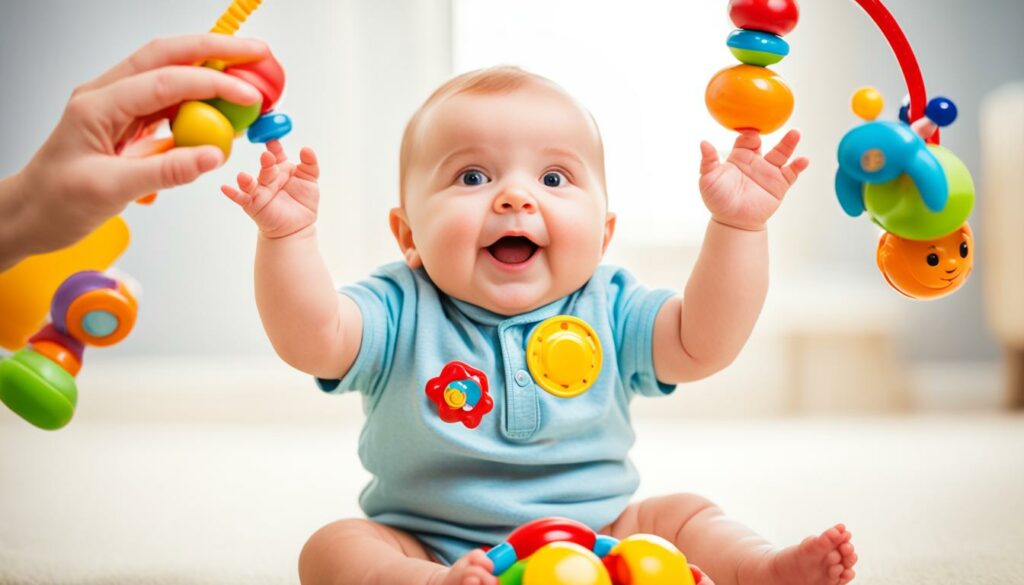
When Do Babies Start Developing Motor Skills?
Babies begin developing motor skills from the moment they are born. As newborns, they start to explore their surroundings and gradually develop core motor skills. Additionally, infants typically begin moving around as they grow, which further enhances their motor skill development5. It is important to encourage and support their physical activities to help them progress in their motor skills5. Motor milestones should be achieved in a specific sequence, with one milestone leading to the next5. While the timing of reaching these milestones may vary from baby to baby, most babies start crawling around 7-9 months5.
Physical movement and skill development play a crucial role in a baby’s daily life5. It is recommended that children, especially infants and toddlers, engage in activities that stimulate their motor skills every day5. Encouraging physical movement not only helps develop motor skills but also has a positive impact on other areas of development, such as cognitive and sensory development5. By providing ample opportunities for babies to engage in physical activities appropriate for their age, parents can foster their motor skill progression5.
Meeting motor milestones is essential for a child’s overall development5. Each milestone achieved acts as a building block, contributing to the progression of motor skills5. For example, babies typically start grasping objects with their hands around 5 to 6 months old6. This initial milestone sets the foundation for further fine motor skill development6. By acknowledging and celebrating these milestones, parents can actively support their baby’s motor skill journey56.
It is interesting to note that certain changes in a baby’s sleep direction can aid in strengthening their neck muscles and head control5. This can help prevent issues like positional plagiocephaly (flat head syndrome) and torticollis (condition affecting neck muscles)5. By providing varied sleep positions, parents can assist their baby’s muscle development and support their overall motor skills5.
Infant Motor Milestones
- Babies start developing motor skills as newborns5.
- Encouragement of physical movement is crucial for their overall development5.
- Achieving motor milestones is important for progressing in motor skills5.
- Changes in sleep direction can aid in strengthening neck muscles and head control5.

Importance of Daily Motor Skill Work
Babies need daily stimulation and opportunities to work on their motor skills. As they grow older, they naturally engage in activities that promote motor skill development. However, infants and toddlers may need extra encouragement and stimulation to enhance their motor skills. It is recommended to incorporate physical movement and skill-building activities into their daily routines to support their overall development.
Regular physical activities are crucial for babies to prevent early motor delays and interruptions in development5. Ensuring that babies meet their motor milestones is essential for their overall development5. Daily motor activities at home play a significant role in the fine and gross motor skill development of babies and children7. Providing opportunities for babies to engage in age-appropriate physical movement and stimulation promotes their motor skill progression and overall growth5.
Encouraging daily motor skill work fosters not only physical development but also cognitive benefits8. Long-term motor skill learning practice is associated with increased cognitive benefits as skill proficiency improves8. Moderate intensity aerobic exercise for more than 30 minutes has the best effect on the executive function of children and adolescents8. The brain function of children and adolescents improves with moderate physical activity lasting at least 60 minutes a day, at least three days a week8.
By incorporating regular motor skill activities into a baby’s daily routine, parents can create a supportive environment that promotes overall development and boosts cognitive and physical capabilities.
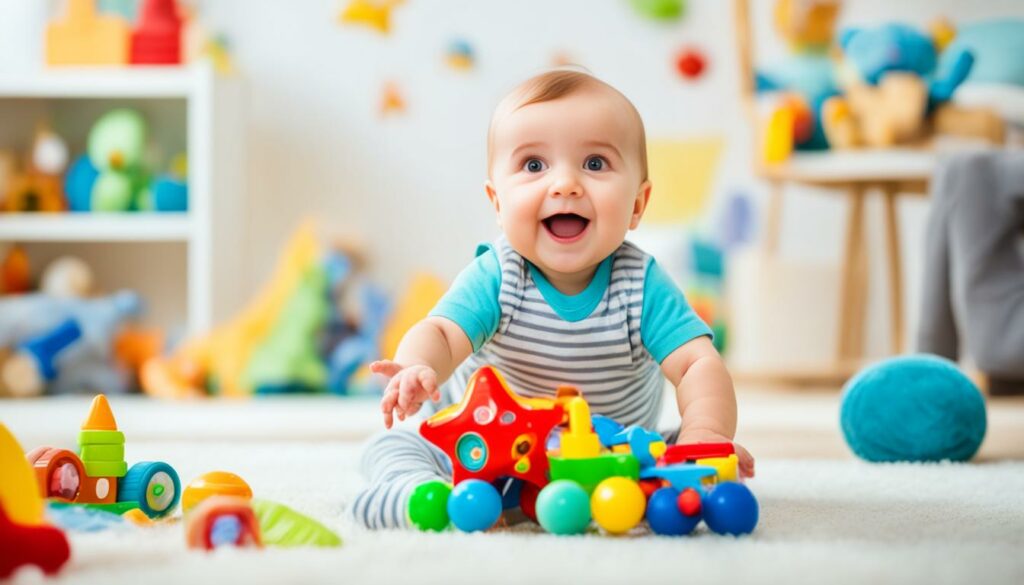
| Benefits | References |
|---|---|
| Promotes physical strength and coordination | 5 |
| Enhances sensory and cognitive development | 5,8 |
| Prevents early motor delays and interruptions in development | 5 |
| Supports overall growth and independence | 5 |
| Boosts cognitive benefits and brain function | 8 |
Milestones to Watch for
Tracking your baby’s motor milestones is an essential part of monitoring their healthy development. Each milestone achieved sets the stage for the next, building strength and confidence in your baby’s motor skills.
Between 0-3 months, your baby will gradually increase their liquid intake, consuming 2 oz. to 6 oz. per feeding9. During this time, your baby will also begin to latch onto the nipple or bottle for feeding9.
From 4-6 months, their diet will expand to include smooth, pureed foods like carrots, sweet potato, squash, apples, and pears9.
By 7-9 months, your baby will develop the ability to hold and drink from a bottle while sitting in a highchair. They may also enjoy chew toys to soothe teething gums9.
Between 10-12 months, your baby will start to finger feed themselves and use an open cup for drinking, increasing their independence during mealtimes9.
As they reach 13-18 months, your baby will begin to consume coarsely chopped table foods and develop the ability to hold and drink from a cup9.
Between 19-24 months, they will explore their creativity by using crayons, pens, or markers to make marks on paper. Additionally, they will start stacking 5 or more small blocks or toys9.
By 2-3 years old, your baby will consistently use 2-3 word phrases and enjoy listening to stories9.
It’s important to note that each baby’s development may vary slightly, so these milestones serve as general guidelines. If you have any concerns or notice significant delays in your baby’s motor skills, don’t hesitate to consult with their healthcare provider for further evaluation and support.
How Sleep Affects Motor Skills
Quality sleep is crucial for your baby’s motor skill development. While sleep may seem unrelated to motor skills, it actually plays a significant role in your baby’s physical development and coordination. Changing the direction of your baby’s sleep position can help strengthen their neck muscles and promote better head control, preventing conditions like flat head syndrome and torticollis. By providing varied sleep positions, you encourage your baby to move their head in different directions, which helps strengthen their neck muscles evenly, supporting their overall motor development.

Sleep position and motor control are closely linked. By varying your baby’s sleep position, you can aid in the development of their motor skills. The10 study, which involved 78 infants, explored the effect of movement during sleep on infants’ walking experience. Parents reported the infants’ first successful walk across a room of over 10 feet, without stopping or falling. The study found that infants in the midst of acquiring walking skills showed worse sleep compared to the estimated sleep patterns for their age group10. Furthermore, infants with more walking experience exhibited more temporally sporadic movement during sleep and a steeper hourly increase in physical activity throughout the night10.
It’s important to understand that sleep not only impacts motor skills but also has a significant effect on overall development. The American Academy of Pediatrics estimates that sleep problems affect 25 to 50 percent of children and 40 percent of adolescents11. Inadequate sleep in early childhood has been linked to issues with the immune system, anxiety, depression, and allergic rhinitis11. Furthermore, poor sleep in adolescents is considered a public health problem and is associated with substance abuse, mental health issues, and increased risk of car crashes and sports injuries11.
Establishing a consistent bedtime routine is essential for ensuring that your baby gets enough sleep and supports their overall development11. Very young babies may not yet have fully developed circadian rhythms and may need soothing techniques, such as talking or gentle touch, if they wake up during the night11. Toddlers, on the other hand, may experience sleep issues due to separation anxiety and fear of missing out, leading to stalling techniques and stubbornness at bedtime11. School-age children often have busy schedules, making it important to follow a consistent sleep schedule and include a wind-down period before bed11. By establishing and maintaining a bedtime routine, you can help your child develop healthy sleep habits, contributing to their overall well-being and motor skill development.
Motor Activities for Babies
Encouraging motor skill development in babies is essential for their overall growth and development. By incorporating simple and engaging physical activities into their daily routines, you can help strengthen their muscles, enhance coordination, and promote both fine and gross motor skills.
Tummy time is a great activity to strengthen your baby’s neck and core muscles. Place your baby on their tummy for short periods throughout the day, providing a safe and comfortable surface. This position also helps them develop the skills needed for rolling over and crawling.5
Playing with a ball is another enjoyable way to promote motor skills. Gently rolling a ball back and forth with your baby encourages reaching, grasping, and hand-eye coordination. As they grow, they will gain more control over their movements and develop their fine motor skills.12
Push and pull toys are perfect for babies who are learning to stand and walk. These toys provide support while allowing them to practice balancing and taking their first steps. Encourage your baby to push or pull the toy across the floor, helping them develop their gross motor skills and coordination.12
Building with blocks is not only a fun way to engage your baby but also helps develop their fine motor skills. As they manipulate and stack blocks, they enhance their hand-eye coordination and finger dexterity. Start with larger blocks for easier handling and gradually introduce smaller ones as they grow.12
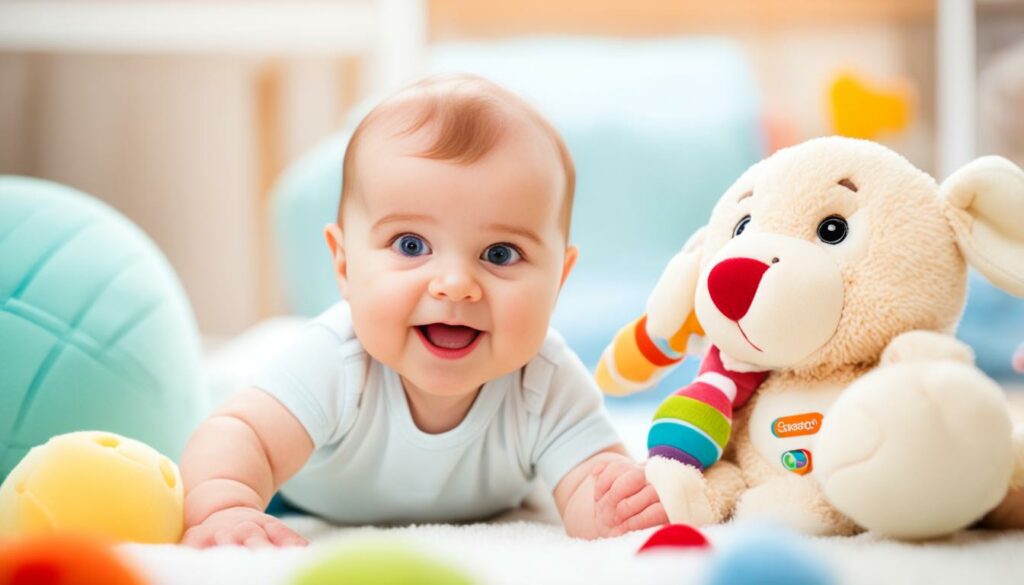
Making noise with newspapers or magazines can be an exciting sensory experience for your baby. Encourage them to crumple or shake these materials, which helps improve their grip and fine motor skills. Sensory activities like this stimulate their senses while promoting motor skill development.12
Providing playmats, tunnels, and large boxes stimulates crawling and overall muscle development. These interactive play areas encourage your baby to explore their environment and engage in physical movement. Crawling and navigating through tunnels help strengthen their muscles and improve their coordination and spatial awareness.12
Remember to create a safe and supervised environment for your baby during these activities. Always offer support and encouragement as they explore and develop their motor skills. With consistent practice and engagement, you will witness their motor skills progress and lay a strong foundation for their future physical development.
Warning Signs for Motor Skills
While babies naturally progress through motor milestones at different rates, it’s important to be aware of certain behaviors that may indicate potential motor delays. Recognizing these warning signs can help parents identify when their baby may need additional support or intervention. Here are some signs to watch for:
- Lack of interest in movement or resistance to physical activities.
- Difficulty with specific motor skills such as crawling, sitting up, or walking.
- Unusual postures or movements, such as persistently sitting in a “w-sitting” position.
- Regression in previously acquired motor skills.
- Compared to their peers, the baby shows difficulties in performing age-appropriate motor skills.
If you notice any of these signs or have concerns about your baby’s motor skills, it’s important to consult their healthcare provider. They can provide further evaluation and guidance to ensure your baby’s motor development is on track. Early intervention services, such as referrals to physical therapists, speech/language therapy, and occupational therapy, can be beneficial for children with motor delays13.
By addressing motor delays early and providing the necessary support, children can overcome challenges and develop their motor skills to their fullest potential. Families with children diagnosed with motor delays can also benefit from support groups and resources offered by organizations like the Muscular Dystrophy Association and the United Cerebral Palsy13.
Helpful Resources:
The American Academy of Pediatrics (AAP) offers an online tool for parents to assess physical developmental delays in children aged 2 months to 5 years13.
Remember, every baby develops at their own pace, and seeking professional guidance can provide peace of mind and ensure that any potential motor delays are addressed promptly and effectively.

Typical vs. Atypical Motor Development
Understanding the difference between typical and atypical motor development is crucial for identifying potential motor delays in babies. Typical motor development follows a specific progression, with babies acquiring different skills over time. Atypical motor development, on the other hand, may indicate a motor delay or underlying condition14.
By tracking your baby’s motor milestones, you can ensure that they are progressing in their motor skills as expected. Achieving these milestones sets the stage for the next set of skills, helping babies gain the strength and confidence to continue developing14. However, if you notice any significant delays or have concerns about your baby’s motor skills, it is crucial to consult their healthcare provider for early intervention and support5.
Early intervention in atypical motor development has proven to significantly reduce difficulties for the individual, negative impacts on families, and lifetime costs to society14. Therefore, it is important to address any concerns promptly to ensure that your baby receives the necessary support for their motor development journey.
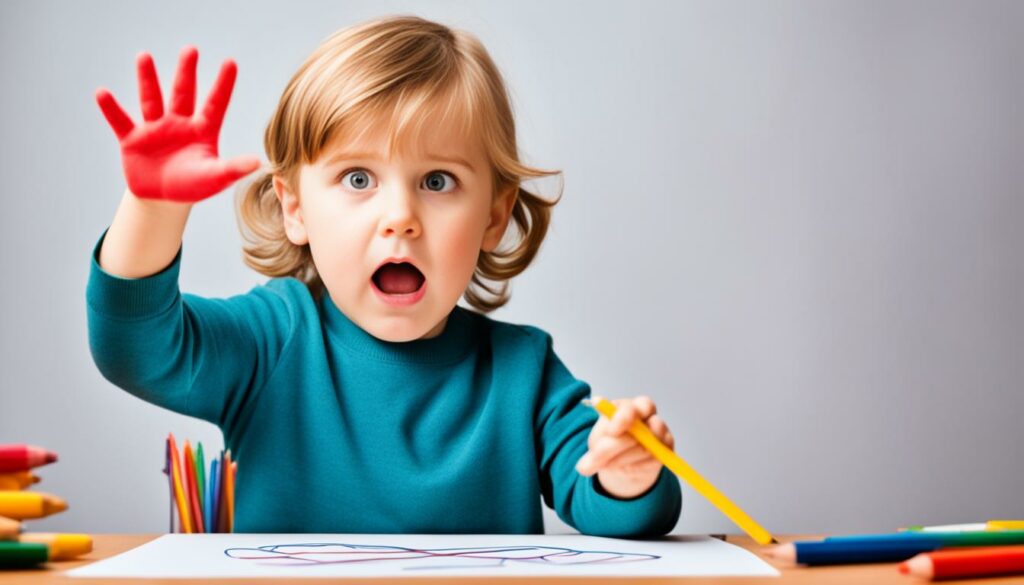
Motor Skills Development: Typical vs. Atypical
| Motor Development Milestones | Typical Development | Atypical Development |
|---|---|---|
| Motor Skills | Follows a specific progression | May indicate a motor delay or underlying condition |
| Fine Motor Skills | Holding objects, picking things up, articulation of the tongue | Difficulty with precise movements, such as grasping objects |
| Gross Motor Skills | Coordination of larger muscle groups | Challenges with movements like crawling or walking |
| Cognitive Skills | Ability to understand and interact with the environment | Delayed or limited cognitive abilities |
| Social-Emotional Skills | Development of emotional connections and reactions | Difficulties in social interactions and emotional responses |
| Speech-Language Skills | Identifying sounds and language learning | Delayed or limited speech and language development |
Recognizing the signs of atypical motor development or motor delays is essential for early intervention. If you suspect a motor delay in your baby, don’t hesitate to contact their healthcare provider for an evaluation. Timely intervention can help address any issues and prevent further delays, ensuring your baby has the best opportunities for healthy motor development5.
Expert Advice on Gross Motor Skills Development
Physical therapists recommend various activities to promote the development of gross motor skills in babies and children. These activities are crucial for their overall growth and physical development, providing the foundation for movement and coordination.
Tummy time is an excellent way to develop core, back, and neck strength. It helps babies build the muscles necessary for sitting, crawling, and eventually walking15. Encourage your baby to spend supervised time on their tummy every day, gradually increasing the duration as they become more comfortable.
Playing with a ball and using push and pull toys are fantastic ways to enhance arm strength and hand-eye coordination. Rolling a ball back and forth or pushing and pulling toys across the floor helps build the necessary muscles and improves dexterity15.
Building with blocks is an engaging activity that strengthens multiple muscle groups. By stacking blocks and manipulating them, babies develop hand-eye coordination, fine motor skills, and problem-solving abilities15.
Offering opportunities for exploration and play through activities like crawling through tunnels and playing with large boxes stimulates crawling and strengthens overall muscle development. It encourages babies to move their bodies, build strength, and improve coordination15.
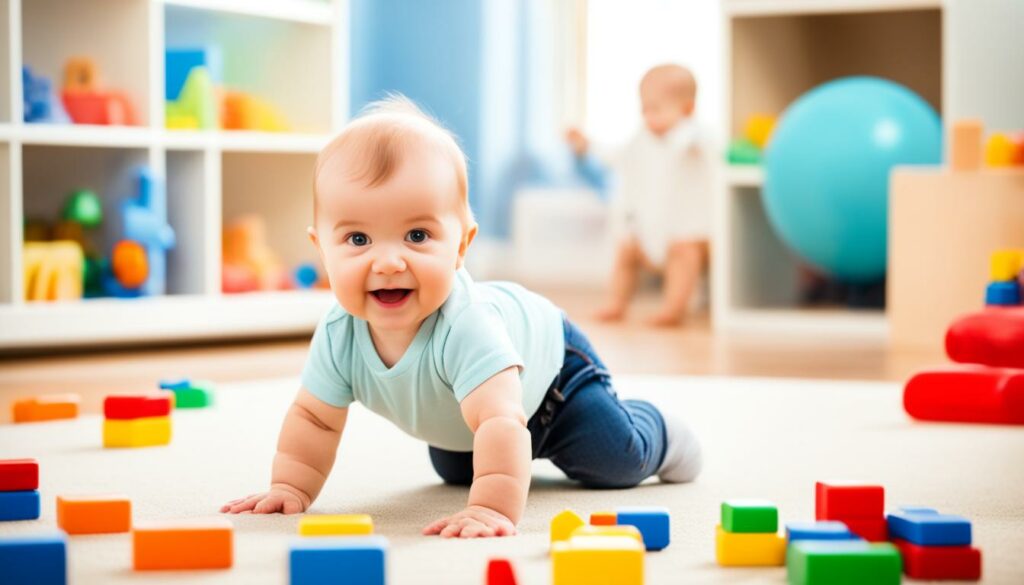
Physical Therapists’ Tips for Gross Motor Skills Development:
- Implement tummy time for core, back, and neck strength.
- Encourage playing with a ball and using push and pull toys for arm strength and coordination.
- Provide blocks for building, promoting multiple muscle group development.
- Offer exploration opportunities through crawling, tunnels, and large boxes for overall muscle development.
By incorporating these activities into your baby’s daily routine, you can foster their gross motor skill development and set them on the path to physical fitness and coordination.
If you have concerns about your baby or child’s gross motor skills, consult with a pediatric physical therapist. They can offer personalized advice and evaluate your child’s strength, balance, coordination, and gross motor skills to identify any barriers to safe movement and provide therapeutic activities if necessary16.
Early Childhood Intervention for Gross Motor Skills
If you have concerns about your child’s gross motor development, early childhood intervention can provide additional support. Physical therapists and specialists can offer assessment and intervention strategies tailored to your child’s needs, helping them reach important motor milestones and develop their skills to their fullest potential.

Research has shown that children are typically expected to support some weight on their legs when held around their chest as early as 2 months old, with most babies supporting their full body weight at 6-7 months17. However, if a child is not sustaining their own body weight for 10-15 seconds by 6 months, it may indicate a developmental concern17.
Early intervention is particularly important as it can address developmental concerns and facilitate proper motor skill progression. The rise in cases of torticollis and plagiocephaly is partly attributed to infants spending more time in reclined sitting positions in car seats, bouncy chairs, swings, high chairs, and strollers17. By seeking professional assistance for motor skills, parents can ensure that their child’s motor development is on track and prevent potential delays.
Physical therapists and specialists can provide a comprehensive evaluation of your child’s gross motor skills, assessing strength, balance, coordination, and identifying areas that need support. They can then develop a personalized intervention plan tailored to your child’s needs, guiding you in promoting gross motor development through specific exercises and activities16. These activities might include engaging in activities that develop foundational skills such as playing with their feet, propping on hands or forearms, and shifting body weight, which are crucial for higher-level motor skill development17.
Physical therapy can help address concerns about children not reaching gross motor skills milestones by providing an assessment of strength, balance, coordination, and offering age-appropriate therapeutic activities16.
Consulting professionals in early childhood intervention can make a significant difference in your child’s motor skill development. They can guide you in incorporating motor skill-building activities into your child’s daily routine and help you monitor their progress and celebrate their achievements. Through regular sessions and support, early childhood intervention can ensure that your child develops the necessary motor skills for physical independence and success in various activities1716.
Remember, early intervention is key when it comes to gross motor skill development. If you have any concerns about your child’s motor skills or suspect a possible delay, don’t hesitate to reach out to professionals for guidance and support.
Conclusion
Developing and promoting infant motor skills is crucial for your baby’s overall growth and independence. Motor skills, including gross and fine motor skills, assist in physical strength, movement, cognitive development, and exploration of the world. By tracking motor milestones, encouraging daily physical activities, and seeking early intervention if needed, you can support your baby’s motor skill development and ensure a solid foundation for their happy and healthy growth.
Research has shown that engaging in physical activities like dancing and swimming can lead to a 20% improvement in motor skills development18. Additionally, play with toys, puzzles, and games has been reported by 75% of parents to positively impact their child’s fine motor skills and hand-eye coordination18.
Limiting screen time can also have a significant impact on your child’s participation in physical play activities, such as dancing and swimming, with a 30% increase observed in families that implement screen time restrictions18. Striking a balance between screen time and physical play is crucial, as children with a balanced approach are 40% more likely to reach developmental milestones related to motor skills18.
To ensure your baby’s motor skill journey, celebrate their unique milestones and provide a nurturing environment with plenty of opportunities for physical play, exploration, and skill building. Remember, every baby progresses at their own pace, so track their motor milestones and consult their healthcare provider if you have any concerns. With your support, your baby will thrive in their motor skill development and embark on a journey of growth and independence.
FAQ
Why are motor skills important?
When do babies start developing motor skills?
Why is daily motor skill work important?
What milestones should I watch for in my baby’s motor development?
How does sleep affect motor skills?
What are some motor activities I can do with my baby?
What are the warning signs for motor skills?
What is the difference between typical and atypical motor development?
What advice do experts give for gross motor skills development?
How can early childhood intervention help with gross motor skills?
Can you summarize the importance of infant motor skills development?
Source Links
- https://www.pathways.org/topics-of-development/motor-skills/
- https://www.similac.com/baby-feeding/development/motor-skills-activities.html
- https://www.thewarrencenter.org/help-information/gross-motor/how-can-i-help-my-baby-develop-gross-motor-skills/
- https://circlecare4kids.com/the-importance-of-motor-skills-in-child-development/
- https://pathways.org/topics-of-development/motor-skills/
- https://www.pregnancybirthbaby.org.au/toddler-development-motor-skills
- https://www.ncbi.nlm.nih.gov/pmc/articles/PMC8625902/
- https://www.ncbi.nlm.nih.gov/pmc/articles/PMC9721199/
- https://pathways.org/all-ages/milestones/
- https://pubmed.ncbi.nlm.nih.gov/36453144/
- https://www.sleepfoundation.org/children-and-sleep
- https://www.mylittlemoppet.com/fine-motor-activities-for-babies-and-toddlers/
- https://www.healthychildren.org/English/ages-stages/baby/Pages/Is-Your-Babys-Physical-Development-on-Track.aspx
- https://www.ncbi.nlm.nih.gov/pmc/articles/PMC9713249/
- https://my.clevelandclinic.org/health/articles/gross-motor-skills
- https://www.chrichmond.org/services/therapy-services/developmental-milestones/gross-motor-skills-birth-to-5-years
- https://www.telipa.org/parents/concerns/motor-skills-movement/
- https://kidscarehomehealth.com/motor-skill-development-a-comprehensive-guide/

